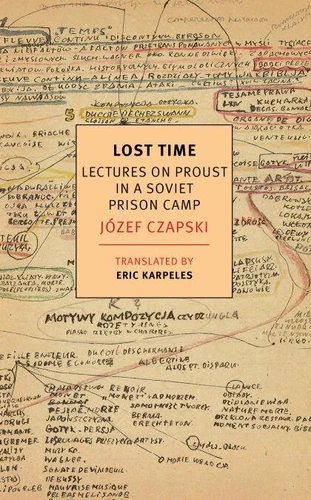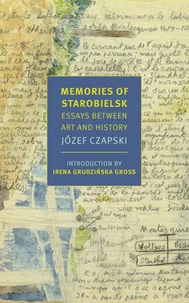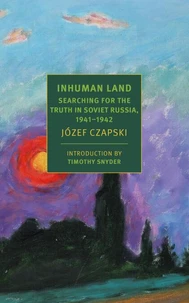Lost Time. Lectures on Proust in a Soviet Prison Camp
Par : ,Formats :
Disponible dans votre compte client Decitre ou Furet du Nord dès validation de votre commande. Le format ePub protégé est :
- Compatible avec une lecture sur My Vivlio (smartphone, tablette, ordinateur)
- Compatible avec une lecture sur liseuses Vivlio
- Pour les liseuses autres que Vivlio, vous devez utiliser le logiciel Adobe Digital Edition. Non compatible avec la lecture sur les liseuses Kindle, Remarkable et Sony
- Non compatible avec un achat hors France métropolitaine
 , qui est-ce ?
, qui est-ce ?Notre partenaire de plateforme de lecture numérique où vous retrouverez l'ensemble de vos ebooks gratuitement
Pour en savoir plus sur nos ebooks, consultez notre aide en ligne ici
- Nombre de pages128
- FormatePub
- ISBN978-1-68137-259-4
- EAN9781681372594
- Date de parution06/11/2018
- Protection num.Adobe DRM
- Taille4 Mo
- Infos supplémentairesepub
- ÉditeurNYRB Classics
Résumé
The first translation of painter and writer Józef Czapski's inspiring lectures on Proust, first delivered in a prison camp in the Soviet Union during World War II. During the Second World War, as a prisoner of war in a Soviet camp, and with nothing but memory to go on, the Polish artist and soldier Józef Czapski brought Marcel Proust's In Search of Lost Time to life for an audience of prison inmates.
In a series of lectures, Czapski described the arc and import of Proust's masterpiece, sketched major and minor characters in striking detail, and movingly evoked the work's originality, depth, and beauty. Eric Karpeles has translated this brilliant and altogether unparalleled feat of the critical imagination into English for the first time, and in a thoughtful introduction he brings out how, in reckoning with Proust's great meditation on memory, Czapski helped his fellow officers to remember that there was a world apart from the world of the camp.
Proust had staked the art of the novelist against the losses of a lifetime and the imminence of death. Recalling that triumphant wager, unfolding, like Sheherazade, the intricacies of Proust's world night after night, Czapski showed to men at the end of their tether that the past remained present and there was a future in which to hope.
In a series of lectures, Czapski described the arc and import of Proust's masterpiece, sketched major and minor characters in striking detail, and movingly evoked the work's originality, depth, and beauty. Eric Karpeles has translated this brilliant and altogether unparalleled feat of the critical imagination into English for the first time, and in a thoughtful introduction he brings out how, in reckoning with Proust's great meditation on memory, Czapski helped his fellow officers to remember that there was a world apart from the world of the camp.
Proust had staked the art of the novelist against the losses of a lifetime and the imminence of death. Recalling that triumphant wager, unfolding, like Sheherazade, the intricacies of Proust's world night after night, Czapski showed to men at the end of their tether that the past remained present and there was a future in which to hope.
The first translation of painter and writer Józef Czapski's inspiring lectures on Proust, first delivered in a prison camp in the Soviet Union during World War II. During the Second World War, as a prisoner of war in a Soviet camp, and with nothing but memory to go on, the Polish artist and soldier Józef Czapski brought Marcel Proust's In Search of Lost Time to life for an audience of prison inmates.
In a series of lectures, Czapski described the arc and import of Proust's masterpiece, sketched major and minor characters in striking detail, and movingly evoked the work's originality, depth, and beauty. Eric Karpeles has translated this brilliant and altogether unparalleled feat of the critical imagination into English for the first time, and in a thoughtful introduction he brings out how, in reckoning with Proust's great meditation on memory, Czapski helped his fellow officers to remember that there was a world apart from the world of the camp.
Proust had staked the art of the novelist against the losses of a lifetime and the imminence of death. Recalling that triumphant wager, unfolding, like Sheherazade, the intricacies of Proust's world night after night, Czapski showed to men at the end of their tether that the past remained present and there was a future in which to hope.
In a series of lectures, Czapski described the arc and import of Proust's masterpiece, sketched major and minor characters in striking detail, and movingly evoked the work's originality, depth, and beauty. Eric Karpeles has translated this brilliant and altogether unparalleled feat of the critical imagination into English for the first time, and in a thoughtful introduction he brings out how, in reckoning with Proust's great meditation on memory, Czapski helped his fellow officers to remember that there was a world apart from the world of the camp.
Proust had staked the art of the novelist against the losses of a lifetime and the imminence of death. Recalling that triumphant wager, unfolding, like Sheherazade, the intricacies of Proust's world night after night, Czapski showed to men at the end of their tether that the past remained present and there was a future in which to hope.





